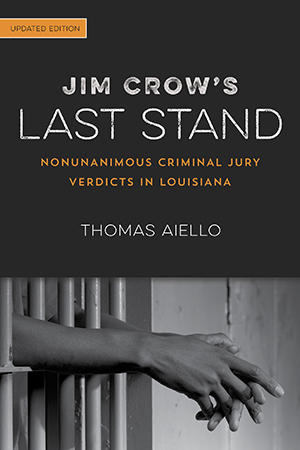
216 pages / 5.50 x 8.50 inches / no illustrations
African-American Studies | Civil Rights | History / United States - Southern History | Law / Legal History & Studies
A remnant of the racist post-Reconstruction Redeemer sociopolitical agenda, Louisiana’s nonunanimous jury-verdict law permitted juries to convict criminal defendants with only nine, and later ten, out of twelve votes: a legal oddity. On the surface, it was meant to speed convictions. In practice, the law funneled many convicts—especially African Americans—into Louisiana’s burgeoning convict lease system. Although it faced multiple legal challenges through the years, the law endured well after convict leasing had ended. Few were aware of its existence, let alone its original purpose. In fact, the original publication of Jim Crow’s Last Stand was one of the first attempts to call attention to the historical injustice caused by this law.
Available now in paperback, this updated edition of Jim Crow’s Last Stand unpacks the origins of the statute in Bourbon Louisiana, traces its survival through the civil rights era and the Supreme Court's decision in Johnson v. Louisiana (1972), and ends with the successful effort to overturn the nonunanimous jury practice, a policy that officially went into effect on January 1, 2019. Jim Crow's Last Stand investigates the ways in which legal policies and patterns of incarceration contributed to a new and lasting form of racial inequality.
Thomas Aiello, a professor of history and African American studies at Valdosta State University, is the author of more than a dozen books, including Jim Crow’s Last Stand: Nonunanimous Criminal Jury Verdicts in Louisiana.
Found an Error? Tell us about it.